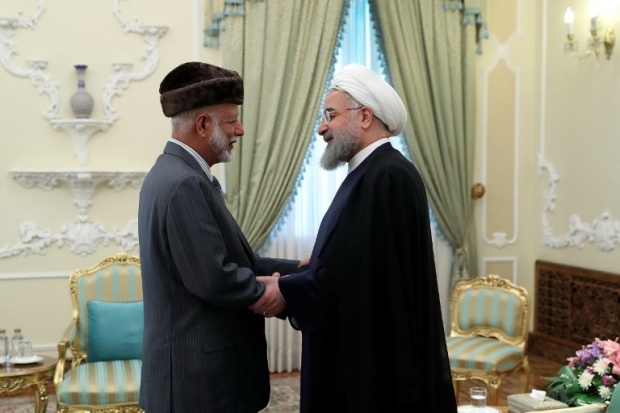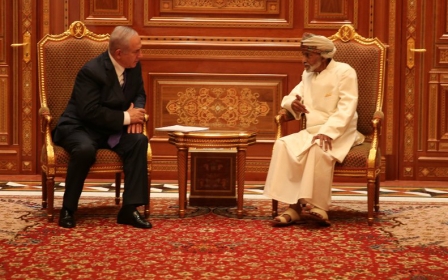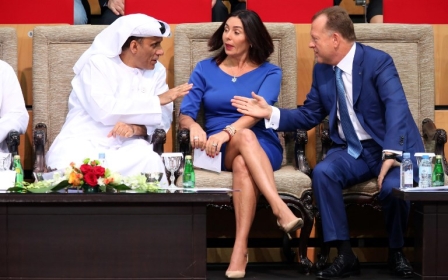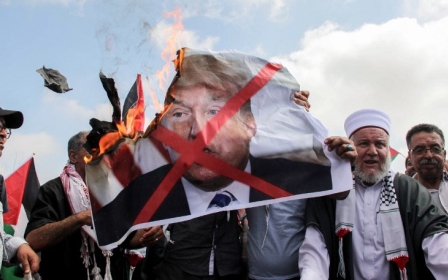How Iran viewed Benjamin Netanyahu's unexpected trip to Oman
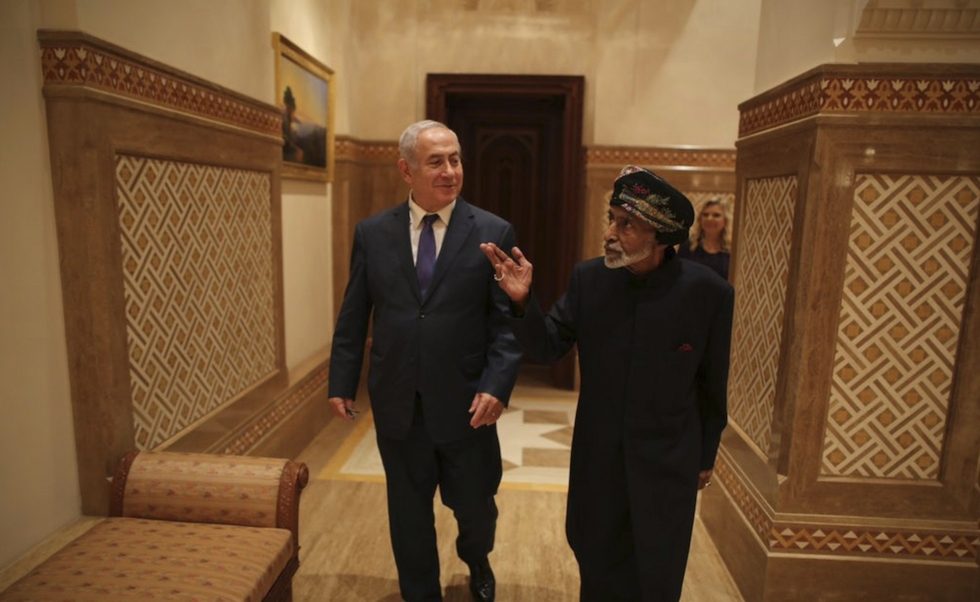
TEHRAN – In Iran, Benjamin Netanyahu’s surprise trip to Oman last week was met with harried speculation over what the Israeli prime minister and Sultan Qaboos may have discussed - and then a bit of a shrug.
Like all six other Gulf Arab countries, Oman does not formally recognise Israel. But last Friday, Netanyahu flew to Muscat at Qaboos’s invitation, a fact widely advertised by the Omani state media.
'Oman is an independent country and obeys no country in the region'
- Fereidoun Majlesi, veteran Iranian diplomat
Israeli diplomats told the Jerusalem Post that the visit had been planned for around 18 months. Netanyahu, they said, met beforehand at an undisclosed location with Oman's foreign minister Yusuf bin Alawi bin Abdullah, and spoke with Qaboos by phone ahead of the meeting.
The Israeli and Omani leaders released a joint statement at the end of the visit saying they had discussed “ways to advance the Middle East peace process” and “a number of issues of mutual interest to achieve peace and stability in the Middle East".
Specific details, however, have not been made public, sending Iranian observers into overdrive: what had the two men talked about?
Netanyahu likely tried to persuade Oman to turn on Iran and brought up Tehran’s presence in Syria, former diplomats and analysts told MEE; while Iran’s foreign ministry spokesman Bahram Qassemi said Netanyahu’s trip was a plan to drive a wedge between Muslim nations.
“Since the beginning of the presidency of Mr Trump, it seems like the Zionist lobby has been activated in the White House and US government more than in the past, in line with the illegitimate interests of the Zionist regime and to pressure the Islamic countries to normalise their diplomatic relationships with [Israel]," said Qassemi.
But whatever the exact focus, observers said they were largely unphased by the visit. It’s not the first by an Israeli prime minister: Yitzhak Rabin visited Oman in 1994 and Shimon Peres went in 1996. Netanyahu, they said, has been on a steady course to build relations with Arab countries so his trip, while a surprise, did not come out of nowhere.
More importantly, Oman, they said, remains a free agent among Iran’s rivals in the Gulf, and with a long history of friendship with Tehran - including helping broker the 2015 nuclear deal - is unlikely to turn on it now.
Fereidoun Majlesi, a veteran Iranian diplomat, told MEE: “Oman is an independent country and obeys no country in the region.”
Friendship between Oman and Iran
The amicable relations between Iran and Oman go back several decades. Between 1972 and 1979, the last Shah of Iran, Mohammad Reza Pahlavi, sent at least 15,000 soldiers, sailors and airmen to defeat Soviet-backed rebels fighting the sultanate in Oman's civil war.
At the time, writes Geraint Hughes, a reader in diplomatic and military history at Kings College London, the Shah aimed to fill the gap left in the Persian Gulf after British withdrawals starting in the late 1960s and also as a “bulwark against revolution in the region”.
After the 1979 Islamic Revolution, Tehran and Muscat maintained ties while relations between Iran and Saudi Arabia soured as Riyadh grew anxious about the potential for revolutionary spillover.
In the past few years, despite the Gulf Cooperation Council's harsh policies towards Iran, Oman has acted independently, fostering Iranian trust in Sultan Qaboos, whom Tehran considers a reliable Gulf ally.
In 2013, Oman acted as a mediator between Iran and the US, paving the way for the broader nuclear talks between Iran and the US, UK, Germany, France, China and Russia, including direct negotiations between high-ranking officials from Tehran and Washington.
After the successful conclusion of the talks in 2015, the deal is now in danger after US President Donald Trump withdrew from the deal in May and reimposed sanctions on Iran. European countries have been attempting to keep the deal alive and find solutions for EU companies that want to invest in Iran, but have found it challenging to get around US control of the world’s banking system.
The response from most Arab countries to the roll out of what Trump has called "the deal of the century" has been muted and, with Netanyahu’s visit to Oman and that of at least three Israeli ministers to Gulf countries in recent weeks, there are signs that quiet relations between Israel and Gulf countries are now bursting out into the open.
Syrian speculation
Nosratollah Tajik, Iran’s former ambassador to Jordan, told MEE that he believes Netanyahu’s primary purpose with the visit was to ingratiate Israel to the Gulf Arab states, not to go after Iran.
“Israel is seizing the opportunity of Trump’s presidency and is seeking to deepen and normalise its relationships with Islamic nations,” he said.
Majlesi, the veteran Iranian diplomat who once served in Iran’s mission in New York, said Netanyahu must have brought Iran up in the discussion, particularly given the timing just days before a new wave of US sanctions hit Tehran.
“He probably asked the Sultanate of Oman not to help Iran in terms of banking and financial issues,” he said. “He probably wants to state that all the sanctions and problems stem from Iran not recognising Tel Aviv, a possible message which wouldn’t be taken seriously in Tehran.”
Even if Netanyahu asked Sultan Qaboos to make life difficult for Iran, Majlesi said Oman’s conduct over the past few decades has shown it follows its own policies, independent of Saudi Arabia and other Gulf states, and will remain loyal to Iran.
Tasnim News Agency, an outlet considered close to conservatives, suggested that it was in fact Israel's discomfort with Iran's foothold in Syria that spurred on the visit.
“Perhaps the biggest nightmare of the Zionist regime is the [victory] that has already been achieved by close allies of Iran in Syria,” the agency wrote. “And that Iran has borders with Israel, but Israel doesn’t. This is a special privilege [that Iran enjoys] and Zionists do not deny their panic about it.”
The news agency also speculated that the visit might be aimed at getting Oman involved in mediating the end of the Syria conflict.
“The Zionist regime, after getting disappointed with Russia and other countries, has resorted to Oman to be the intermediary between the regime and Syria,” the agency wrote.
Rasool Hosseini, a foreign policy expert who writes across the Iranian media, told MEE it might be possible for Oman to be drawn into mediating the Syria conflict, but he didn’t think it would succeed where Russia hadn’t.
“When Russia couldn’t and didn’t accept Israeli demands for kicking Iran out of Syria, how would Oman be able to do that?” he said.
“What shouldn’t be ignored here is that Oman is a country which doesn’t want to have a negative relationship with any country, especially Iran. Therefore, I don’t believe that Oman would be willing to go behind Iran because of Netanyahu’s demand.”
New MEE newsletter: Jerusalem Dispatch
Sign up to get the latest insights and analysis on Israel-Palestine, alongside Turkey Unpacked and other MEE newsletters
Middle East Eye delivers independent and unrivalled coverage and analysis of the Middle East, North Africa and beyond. To learn more about republishing this content and the associated fees, please fill out this form. More about MEE can be found here.


